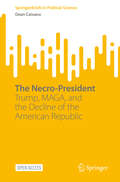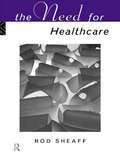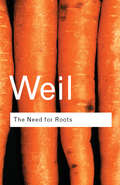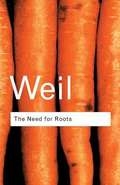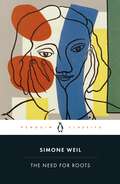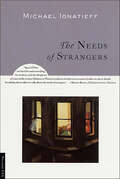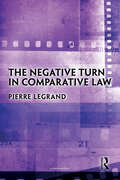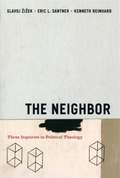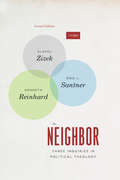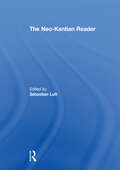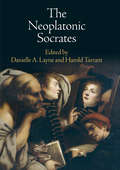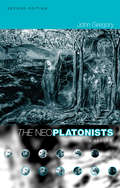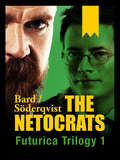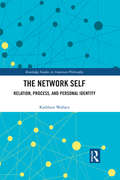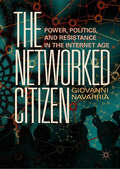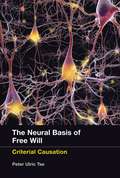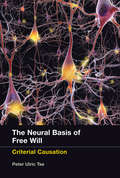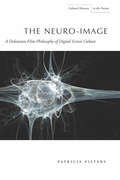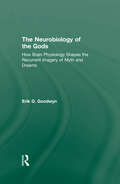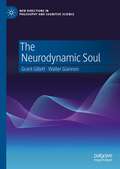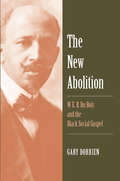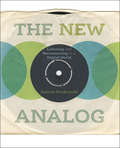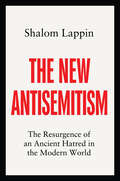- Table View
- List View
The Necro-President: Trump, MAGA, and the Decline of the American Republic (SpringerBriefs in Political Science)
by Dean CaivanoThis Brief develops the necro-president as a figure through which the collapse of American political life becomes visible. In our present moment of political upheaval, the necro-president reflects how death, not law or the people, has come to shape the meaning of the presidency. The office, once imagined as a source of vitality and democratic promise, now signals exhaustion, spectacle, and symbolic decay. Focusing on the 2024 election, The Necro-President shows how Joe Biden and Donald Trump came to represent two sides of a collapsing republic. Biden, cast as a spectral figure, became a symbol of entropy and decline. Trump, by contrast, positioned himself as a resurrectionist, a messianic leader who could overcome decay and save the republic. What followed was not the return of life to the presidency but the normalization of death as a mode of rule. This critical philosophical intervention moves beyond debates about democratic erosion and constitutional crisis. It asks what happens when political life continues even after the symbols that once gave it meaning have gone hollow. This book is open access.
The Need For Health Care (Social Ethics and Policy)
by W.R. SheaffThe rhetoric of 'needs' has been used to legitimate all major turns in UK health policy since 1936. This study identifies the ethical, policy and technical issues arising from the concept of needs. In the first part a theory of needs is developed, which takes into account both the philosophical traditions and the practical problems arising in daily health care. In a second part, health systems throughout the world are described and compared, addressing ethical as well as economical questions. Its interdisciplinary approach will make The Need for Healthcare important reading not only for those interested in or employed in the health care sector but also for students of philosophy.
The Need for Roots: Prelude to a Declaration of Duties Towards Mankind (Routledge Classics)
by Simone WeilHailed by Andre Gide as the patron saint of all outsiders, Simone Weil's short life was ample testimony to her beliefs. In 1942 she fled France along with her family, going firstly to America. She then moved back to London in order to work with de Gaulle. Published posthumously The Need for Roots was a direct result of this collaboration. Its purpose was to help rebuild France after the war. In this, her most famous book, Weil reflects on the importance of religious and political social structures in the life of the individual. She wrote that one of the basic obligations we have as human beings is to not let another suffer from hunger. Equally as important, however, is our duty towards our community: we may have declared various human rights, but we have overlooked the obligations and this has left us self-righteous and rootless. She could easily have been issuing a direct warning to us today, the citizens of Century 21.
The Need for Roots: Prelude to a Declaration of Duties towards Mankind
by Simone Weil Arthur WillisHailed by Andre Gide as the patron saint of all outsiders, Simone Weil's short life was ample testimony to her beliefs. In 1942 she fled France along with her family, going firstly to America. She then moved back to London in order to work with de Gaulle. Published posthumously The Need for Rootswas a direct result of this collaboration. Its purpose was to help rebuild France after the war. In this, her most famous book, Weil reflects on the importance of religious and political social structures in the life of the individual. She wrote that one of the basic obligations we have as human beings is to not let another suffer from hunger. Equally as important, however, is our duty towards our community: we may have declared various human rights, but we have overlooked the obligations and this has left us self-righteous and rootless. She could easily have been issuing a direct warning to us today, the citizens of Century 21.
The Need for Roots: Prelude to a Declaration of Obligations towards the Human Being (Routledge Classics Ser.)
by Simone WeilA new translation of Simone Weil's best-known work: a political, philosophical and spiritual treatise on what human life could beWhat do humans require to be truly nourished? Simone Weil, one of the foremost philosophers of the last century, envisaged us all as being bound by unconditional, eternal obligations towards every other human being. In The Need for Roots, her most famous work, she argued that our greatest need was to be rooted: in a community, a place, a shared past and collective future hopes. Written for the Free French movement while she was exiled in London during the Second World War, Weil's visionary combination of philosophy, politics and mysticism is her answer to the question of what life without occupation - and oppression - might be.'The patron saint of all outsiders' Andre Gide'The only great spirit of our time' Albert Camus Translated by Ros Schwartz, with an introduction by Kate Kirkpatrick.
The Needs of Strangers
by Michael IgnatieffThis thought provoking book uncovers a crisis in the political imagination, a wide-spread failure to provide the passionate sense of community "in which our need for belonging can be met." Seeking the answers to fundamental questions, Michael Ignatieff writes vividly both about ideas and about the people who tried to live by them-from Augustine to Bosch, from Rousseau to Simone Weil. Incisive and moving, The Needs of Strangers returns philosophy to its proper place, as a guide to the art of being human.
The Negative Turn in Comparative Law
by Pierre LegrandThis book’s essays aim subversively and resolutely to replace the hegemonic discursive frame governing comparative law. Beyond harnessing negative critique to resist the orthodoxy’s self-assured cognitive assumptions, at once unexamined and indefensible, the argument mobilizes negativity as an empowering idea, a resource towards the displacement of the brand of comparative law that has been fostering a closing of the comparing mind. To answer the demands of the moment and herald foreign law research as a creditable intellectual development, one requires to engage in a culturalist theorization and practice of comparative law at radical variance from the prevailing positivist model. The negative turn, then, is a call to comparative action – a comparactive motion – in support of the robustly indisciplined thinking that must thoroughly inform research into foreign law. In photography, the negative has been employed productively to generate a positive print. In comparative law, negation wants to affirm edifying epistemic yields.This book will benefit all law teachers and postgraduate law students interested in the workings of law on the international scene, whether specialists in comparative law, public international law, private international law, transnational law, or foreign relations law – in particular, individuals bringing to bear a critical inclination to their subject-matter.
The Neighbor: Three Inquiries in Political Theology
by Slavoj Zizek Eric L. Santner Kenneth ReinhardIn Civilization and Its Discontents, Freud made abundantly clear what he thought about the biblical injunction, first articulated in Leviticus 19:18 and then elaborated in Christian teachings, to love one's neighbor as oneself. "Let us adopt a naive attitude towards it," he proposed, "as though we were hearing it for the first time; we shall be unable then to suppress a feeling of surprise and bewilderment." In The Neighbor, three of the most significant intellectuals working in psychoanalysis and critical theory collaborate to show how this problem of neighbor-love opens questions that are fundamental to ethical inquiry and that suggest a new theological configuration of political theory.
The Neighbor: Three Inquiries in Political Theology, with a new Preface
by Slavoj Žižek Eric L. Santner Kenneth ReinhardIn Civilization and Its Discontents, Freud made abundantly clear what he thought about the biblical injunction, first articulated in Leviticus 19:18 and then elaborated in Christian teachings, to love one's neighbor as oneself. “Let us adopt a naive attitude towards it,” he proposed, “as though we were hearing it for the first time; we shall be unable then to suppress a feeling of surprise and bewilderment.” After the horrors of World War II, the Holocaust, and Stalinism, Leviticus 19:18 seems even less conceivable—but all the more urgent now—than Freud imagined. In The Neighbor, three of the most significant intellectuals working in psychoanalysis and critical theory collaborate to show how this problem of neighbor-love opens questions that are fundamental to ethical inquiry and that suggest a new theological configuration of political theory. Their three extended essays explore today's central historical problem: the persistence of the theological in the political. In “Toward a Political Theology of the Neighbor,” Kenneth Reinhard supplements Carl Schmitt’s political theology of the enemy and friend with a political theology of the neighbor based in psychoanalysis. In “Miracles Happen,” Eric L. Santner extends the book's exploration of neighbor-love through a bracing reassessment of Benjamin and Rosenzweig. And in an impassioned plea for ethical violence, Slavoj Žižek’s “Neighbors and Other Monsters” reconsiders the idea of excess to rehabilitate a positive sense of the inhuman and challenge the influence of Levinas on contemporary ethical thought. A rich and suggestive account of the interplay between love and hate, self and other, personal and political, The Neighbor has proven to be a touchstone across the humanities and a crucial text for understanding the persistence of political theology in secular modernity. This new edition contains a new preface by the authors.
The Neo-Kantian Reader
by Sebastian LuftThe latter half of the nineteenth and the early part of the twentieth century witnessed a remarkable resurgence of interest in Kant’s philosophy in Continental Europe, the effects of which are still being felt today. The Neo-Kantian Reader is the first anthology to collect the most important primary sources in Neo-Kantian philosophy, with many being published here in English for the first time. It includes extracts on a rich and diverse number of subjects, including logic, epistemology, metaphysics, philosophy of science, and transcendental idealism.Sebastian Luft, together with other scholars, provides clear introductions to each of the following sections (to the authors as well as to each text), placing them in historical and philosophical context: the beginnings of Neo-Kantianism: including the work of Hermann von Helmholtz, Otto Liebman, Friedrich Lange, and Hermann Lotze the Marburg School: including Hermann Cohen, Paul Natorp, and Ernst Cassirer the Southwest School: including Wilhelm Windelband, Heinrich Rickert, Emil Lask, and Hans Vaihinger responses and critiques: including Moritz Schlick, Edmund Husserl; Rudolf Carnap, and the 'Davos dispute' between Martin Heidegger and Ernst Cassirer. The Neo-Kantian Reader is essential reading for all students of Kant, nineteenth and twentieth century philosophy, history and philosophy of science, and phenomenology, as well as to those studying important philosophical movements such as logical positivism and analytic philosophy and its history.
The Neoplatonic Socrates
by Harold Tarrant Danielle A. LayneToday the name Socrates invokes a powerful idealization of wisdom and nobility that would surprise many of his contemporaries, who excoriated the philosopher for corrupting youth. The problem of who Socrates "really" was—the true history of his activities and beliefs—has long been thought insoluble, and most recent Socratic studies have instead focused on reconstructing his legacy and tracing his ideas through other philosophical traditions. But this scholarship has neglected to examine closely a period of philosophy that has much to reveal about what Socrates stood for and how he taught: the Neoplatonic tradition of the first six centuries C.E., which at times decried or denied his importance yet relied on his methods.In The Neoplatonic Socrates, leading scholars in classics and philosophy address this gap by examining Neoplatonic attitudes toward the Socratic method, Socratic love, Socrates's divine mission and moral example, and the much-debated issue of moral rectitude. Collectively, they demonstrate the importance of Socrates for the majority of Neoplatonists, a point that has often been questioned owing to the comparative neglect of surviving commentaries on the Alcibiades, Gorgias, Phaedo, and Phaedrus, in favor of dialogues dealing explicitly with metaphysical issues. Supplemented with a contextualizing introduction and a substantial appendix detailing where evidence for Socrates can be found in the extant literature, The Neoplatonic Socrates makes a clear case for the significant place Socrates held in the education and philosophy of late antiquity.Contributors: Crystal Addey, James M. Ambury, John F. Finamore, Michael Griffin, Marilynn Lawrence, Danielle A. Layne, Christina-Panagiota Manolea, François Renaud, Geert Roskam, Harold Tarrant.
The Neoplatonists
by John GregoryThis extensively revised and updated second edition of The Neoplatonists provides a valuable introduction to the thought of the four central Neoplatonist philosophers, Plotinus, Porphyry, Proclus and Iamblichus.
The Netocracts
by Alexander Bard Jan SöderqvistHistory is always written from the perspective of the ruling or rising elite at the time of writing. Concepts like The Stone Age, The Bronze Age, etc. were of course unknown during the stone age and the bronze age. They were invented in the 1800s to make sense of a development that seemed to reach its climax with industrialisation...
The Network Self: Relation, Process, and Personal Identity (Routledge Studies in American Philosophy)
by Kathleen WallaceThe concept of a relational self has been prominent in feminism, communitarianism, narrative self theories, and social network theories, and has been important to theorizing about practical dimensions of selfhood. However, it has been largely ignored in traditional philosophical theories of personal identity, which have been dominated by psychological and animal theories of the self. This book offers a systematic treatment of the notion of the self as constituted by social, cultural, political, and biological relations. The author’s account incorporates practical concerns and addresses how a relational self has agency, autonomy, responsibility, and continuity through time in the face of change and impairments. This cumulative network model (CNM) of the self incorporates concepts from work in the American pragmatist and naturalist tradition. The ultimate aim of the book is to bridge traditions that are often disconnected from one another—feminism, personal identity theory, and pragmatism—to develop a unified theory of the self.
The Networked Citizen: Power, Politics, and Resistance in the Internet Age
by Giovanni NavarriaThis book investigates the changing meanings of power and politics in the Internet age and questions whether the political category of the citizen still has a meaningful role to play in the highly-mediated dynamics of an increasingly networked world. To answer such questions, the book analyses and compares the impact of the Internet on the relationship between state, citizens, and politics in three countries: the USA, Italy, and China. The book’s journey starts in the mid-90s and ends in 2016. It pays particular attention to Obama 2008 and Trump 2016 presidential campaigns, the ascendance to power in Italy of the anti-establishment Five Star Movement, and to the enduring Chinese government’s struggle to control the Internet public opinion. The book challenges the traditional understanding of power through which the strong typically prevails over the weak. This leads to a clearer understanding of the wider role citizens can play (and must play) in a networked political sphere, while it also warns the reader on the many risks citizens face in a post-truth world.The book challenges the traditional understanding of power through which the strong typically prevails over the weak. This leads to a clearer understanding of the wider role citizens can play (and must play) in a networked political sphere.
The Neural Basis of Free Will
by Peter Ulric TseThe issues of mental causation, consciousness, and free will have vexed philosophers since Plato. In this book, Peter Tse examines these unresolved issues from a neuroscientific perspective. In contrast with philosophers who use logic rather than data to argue whether mental causation or consciousness can exist given unproven first assumptions, Tse proposes that we instead listen to what neurons have to say. Because the brain must already embody a solution to the mind--body problem, why not focus on how the brain actually realizes mental causation? Tse draws on exciting recent neuroscientific data concerning how informational causation is realized in physical causation at the level of NMDA receptors, synapses, dendrites, neurons, and neuronal circuits. He argues that a particular kind of strong free will and "downward" mental causation are realized in rapid synaptic plasticity. Recent neurophysiological breakthroughs reveal that neurons function as criterial assessors of their inputs, which then change the criteria that will make other neurons fire in the future. Such informational causation cannot change the physical basis of information realized in the present, but it can change the physical basis of information that may be realized in the immediate future. This gets around the standard argument against free will centered on the impossibility of self-causation. Tse explores the ways that mental causation and qualia might be realized in this kind of neuronal and associated information-processing architecture, and considers the psychological and philosophical implications of having such an architecture realized in our brains.
The Neural Basis of Free Will: Criterial Causation
by Peter Ulric TseA neuroscientific perspective on the mind–body problem that focuses on how the brain actually accomplishes mental causation. The issues of mental causation, consciousness, and free will have vexed philosophers since Plato. In this book, Peter Tse examines these unresolved issues from a neuroscientific perspective. In contrast with philosophers who use logic rather than data to argue whether mental causation or consciousness can exist given unproven first assumptions, Tse proposes that we instead listen to what neurons have to say. Tse draws on exciting recent neuroscientific data concerning how informational causation is realized in physical causation at the level of NMDA receptors, synapses, dendrites, neurons, and neuronal circuits. He argues that a particular kind of strong free will and “downward” mental causation are realized in rapid synaptic plasticity. Such informational causation cannot change the physical basis of information realized in the present, but it can change the physical basis of information that may be realized in the immediate future. This gets around the standard argument against free will centered on the impossibility of self-causation. Tse explores the ways that mental causation and qualia might be realized in this kind of neuronal and associated information-processing architecture, and considers the psychological and philosophical implications of having such an architecture realized in our brains.
The Neuro-Image: A Deleuzian Film-Philosophy of Digital Screen Culture
by Patricia PistersArguing that today's viewers move through a character's brain instead of looking through his or her eyes or mental landscape, this book approaches twenty-first-century globalized cinema through the concept of the "neuro-image." Pisters explains why this concept has emerged now, and she elaborates its threefold nature through research from three domains—Deleuzian (schizoanalytic) philosophy, digital networked screen culture, and neuroscientific research. These domains return in the book's tripartite structure. Part One, on the brain as "neuroscreen," suggests rich connections between film theory, mental illness, and cognitive neuroscience. Part Two explores neuro-images from a philosophical perspective, paying close attention to their ontological, epistemological, and aesthetic dimensions. Political and ethical aspects of the neuro-image are discussed in Part Three. Topics covered along the way include the omnipresence of surveillance, the blurring of the false and the real and the affective powers of the neo-baroque, and the use of neuro-images in politics, historical memory, and war.
The Neurobiology of the Gods: How Brain Physiology Shapes the Recurrent Imagery of Myth and Dreams
by Erik D. GoodwynWhere does science end and religion begin? Can "spiritual" images and feelings be understood on a neurobiological level without dismissing their power and mystery? In this book, psychiatrist Erik Goodwyn addresses these questions by reviewing decades of research, putting together a compelling argument that the emotional imagery of myth and dreams can be traced to our deep brain physiology, and importantly, how a sensitive look at this data reveals why mythic or religious symbols are indeed more "godlike" than we might have imagined. The Neurobiology of the Gods weaves together Jungian depth psychology with research in evolutionary psychology, neuroanatomy, cognitive science, neuroscience, anthropology, mental imagery, dream research, and metaphor theory into a comprehensive model of how our brains contribute to the recurrent images of dreams, myth, religion and even hallucinations. Divided into three sections, this book provides: definitions and foundations an examination of individual symbols conclusive thoughts on how brain physiology shapes the recurring images that we experience. Goodwyn shows how common dream, myth and religious experiences can be meaningful and purposeful without discarding scientific rigor. The Neurobiology of the Gods will therefore be essential reading for Jungian analysts and psychologists as well as those with an interest in philosophy, anthropology and the interface between science and religion.
The Neurodynamic Soul (New Directions in Philosophy and Cognitive Science)
by Walter Glannon Grant GillettThis book is an analysis and discussion of the soul as a psychophysical process and its role in mental representation, meaning, understanding and agency. Grant Gillett and Walter Glannon combine contemporary neuroscience and philosophy to address fundamental issues about human existence and living and acting in the world. Based in part on Aristotle's hylomorphism and model of the psyche, their approach is informed by a neuroscientific model of the brain as a dynamic organ in which patterns of neural oscillation and synchronization are shaped by biological, social and cultural factors inside and outside of it. The authors provide a richer and more robust account of the soul, or mind, than other accounts by framing it in neuroscientific and philosophical terms that do not explain it away but explain it as something that is shaped by how it responds to the natural and social environment in enabling flexible and adaptive behavior.
The Neutral: Lecture Course at the College de France (1977-1978) (European Perspectives: A Series in Social Thought and Cultural Criticism)
by Roland BarthesThe Neutral (le neutre), as Barthes describes it, escapes or undoes the paradigmatic binary oppositions that structure and produce meaning in Western thought and discourse. These binaries are found in all aspects of human society ranging from language to sexuality to politics. For Barthes, the attempt to deconstruct or escape from these binaries has profound ethical, philosophical, and linguistic implications. <p><p> The Neutral is comprised of the prewritten texts from which Barthes lectured and centers around 23 "figures," also referred to as "traits" or "twinklings," that are possible embodiments of the Neutral (sleep, silence, tact, etc.) or of the anti-Neutral (anger, arrogance, conflict, etc.). His lectures draw on a diverse set of authors and intellectual traditions, including Lao-tzu, Tolstoy, German mysticism, classical philosophy, Rousseau, Baudelaire, Walter Benjamin, and John Cage. Barthes's idiosyncratic approach to his subjects gives the lectures a playful, personal, and even joyous quality that enhances his rich insights. <p> In addition to his reflections on a variety of literary and scholarly works, Barthes's personal convictions and the events of his life shaped the course and content of the lectures. Most prominently, as Barthes admits, the recent death of his mother and the idea of mourning shape several of his lectures.
The Never End: The Other Orwell, the Cold War, the CIA, MI6, and the Origin of Animal Farm
by John ReedThis book presents full history of the origin of Orwell’s Animal Farm, as well as a translation of the Russuian/Ukranian source work. Has George Orwell lost his saintly luster? In The Never End, rabble-rouser, dogged investigator, and consummate literary stylist John Reed collects two decades of subject-Orwell findings previously published in Pank, Guernica, Literary Hub, The Brooklyn Rail, The Rumpus, The New York Press, The Believer, Harper’s Magazine and The Paris Review. Reed’s treatment of Orwell is corrective and peerlessly contemporary; he views Orwell in a twenty-first century global context, considering Orwell’s collaboration with Cold War intelligence operations—US and UK—with unfaltering objectivity. It’s hard to imagine that Orwell—in our own moment of global doublethink—wouldn’t have wanted his devotion to contrariety applied to the literary legacy he left behind. The Never End is at once a hatchet job and a celebration. Animal Farm, based on a previously unknown Russian short story? Animal Farm, deployed by the CIA, MI6 and the Congress for Cultural Freedom? Orwell, turning over blacklists in a McCarthy-esque act of betrayal? The Cold War? Does it last forever? Russia, the “Axis of Evil,” and now China? But. Orwell. Course syllabi. Literary laurels. Snitch. Why do we keep coming back? For the wrong reasons? Or because we know Old Benjamin would want us to know the truth?
The New Abolition
by Gary DorrienThe black social gospel emerged from the trauma of Reconstruction to ask what a "new abolition" would require in American society. It became an important tradition of religious thought and resistance, helping to create an alternative public sphere of excluded voices and providing the intellectual underpinnings of the civil rights movement. This tradition has been seriously overlooked, despite its immense legacy. In this groundbreaking work, Gary Dorrien describes the early history of the black social gospel from its nineteenth-century founding to its close association in the twentieth century with W. E. B. Du Bois. He offers a new perspective on modern Christianity and the civil rights era by delineating the tradition of social justice theology and activism that led to Martin Luther King Jr. "
The New Analog: Listening and Reconnecting in a Digital World
by Damon KrukowskiAn NPR Best Book of the Year: &“A pointedly passionate look at what&’s been lost in the digital era.&” —Los Angeles Times A longtime musician and former member of the indie band Galaxie 500 who has also taught at Harvard, Damon Krukowski has watched cultural life lurch from analog to digital. And as an artist who has weathered that transition, he has challenging, urgent questions for both creators and consumers about what we have thrown away in the process: Are our devices leaving us lost in our own headspace even as they pinpoint our location? Does the long reach of digital communication come at the sacrifice of our ability to gauge social distance? Does streaming media discourage us from listening closely? Are we hearing each other fully in this new environment? Rather than simply rejecting the digital disruption of cultural life, Krukowski uses the sound engineer&’s distinction of signal and noise to reexamine what we have lost as a technological culture, looking carefully at what was valuable in the analog realm so we can hold on to it. Taking a set of experiences from the production and consumption of music that have changed since the analog era—the disorientation of headphones, flattening of the voice, silence of media, loudness of mastering, and manipulation of time—as a basis for a broader exploration of contemporary culture, Krukowski gives us a brilliant meditation and guide to keeping our heads amid the digital flux. Think of it as plugging in without tuning out. &“This is not a book about why vinyl sounds better; it&’s way more interesting than that . . . [It] is full of things I didn&’t know, like why people yell into cellphones . . . Ultimately, it&’s about how we consume sound as a society—which is, increasingly, on an individual basis.&” —NPR &“If you&’re a devoted music fan who&’s dubious about both rosy nostalgia and futuristic utopianism, Damon Krukowski&’s The New Analog is for you.&” —The New York Times Book Review
The New Antisemitism: The Resurgence of an Ancient Hatred in the Modern World
by Shalom LappinGenerations raised after the Second World War took for granted a world of stability and prosperity, and with it the waning of ancient hatreds. Recent decades have been more sobering. Instability and extremism have returned in force. As Shalom Lappin explains in this worrying book, an upsurge of antisemitism across the political spectrum has accompanied them. Recent events in the Middle East have transformed it into a tidal wave. Lappin explores in particular the disturbing correlation between the expansion of economic globalization and the return of the anti-Jewish ideas that we thought had been consigned to the past. He examines this relationship within the context of the assault on democracy and social cohesion that anti-globalist reactions have launched in different parts of the world. To understand contemporary antisemitism, Lappin argues, it is essential to recognize the way in which its antecedents have become deeply embedded in Western and Middle Eastern cultures over millennia. This allows hostility to Jews to cross political boundaries easily, left and right, in a way that other forms of racism do not. Combatting antisemitism effectively requires a new progressive politics that addresses its root causes. The New Antisemitism is crucial reading for anyone concerned with the social pathologies unleashed by our current economic and political discontents.
